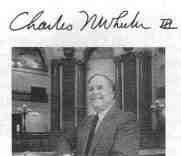Politicians won't welcome
campaign finance reform soon

by Charles N. Wheeler III
"The check is in the mail." And, "I'll still respect you in the morning."
Everyone's familiar with those icons of dissemblance in financial matters and personal affairs. Recently, they've been joined by another from political life that's just as disingenuous: "Campaign contributions don't influence votes."
Politicians and their flaks have been chanting that mantra of late in response to new calls for tightening the state's wide-open campaign finance system. The reform push comes in the wake of a spring legislative session that some viewed as too responsive to the interests of well-heeled donors.
In a limited sense, the apologists for Illinois' anything-goes fundraising are correct - contributors can't order up votes in the same way, say, that one can go to McDonald's and plunk down $2.09 plus tax for a Big Mac. But only the terminally naive would believe that all those megabuck givers are motivated by generic interest in good government.
Instead, campaign contributions are better seen as investments that donors hope will yield returns when public policy is being shaped on issues they care about.
Consider, for example, the fundamental changes contained in the comprehensive gambling bill the legislature approved in the session's waning days. The measure would:
• Permit dockside gaming, thus functionally erasing the current ban on land-based casinos.
• Allow a shuttered riverboat to move to suburban Rosemont, hardly the kind of down-and-out river town whose economic revival was used in 1991 to justify initial approval of riverboat gambling.
• Provide tax breaks and an ongoing subsidy, through skimmed casino profits, for the state's horse racing industry, which one reasonably could argue is failing because its product is no longer competitive with other entertainment options, and thus, under free market principles, does not merit a bailout.
Proponents, of course, offer reasonable arguments in support of such dramatic shifts, though one can't help but wonder whether those arguments were made more compelling by the more than $4.7 million in campaign contributions made by gambling interests over the last six years.
In the 1998 election cycle alone, riverboat interests and Rosemont Mayor Donald Stephens donated more than $870,000 to candidates for governor, other statewide offices and the legislature, according to a report compiled by the Sunshine Project, an effort to increase public awareness of how political campaigns are funded in Illinois.
Horse racing interests chipped in some $880,000 for the 1998 cycle, more than $630,000 of it from Arlington International Racecourse owner Richard Duchossois, family members and the companies the family owns or operates, the project reported.
At the least, such contributions help donors gain access to policy-makers to argue their case. Even better from a giver's perspective, a contribution may help elect someone who already shares the donor's position on a critical issue.
Thus, when the Illinois State Medical Society contributed more than $1 million to Republican legislative war chests in the 1994 cycle, the doctors weren't hoping to convince Republicans to support limits on damage awards in malpractice cases. Their goal instead was to elect GOP majorities in both chambers, because party leaders and most rank-and-file Republicans already sincerely believed that making it more difficult for plaintiffs to collect in personal injury cases was sound public policy. The investments by the Medical Society and other advocates of so-called tort reform paid off; early in 1995, the newly elected GOP majorities muscled through a $500,000 cap on noneconomic damages and other restrictions on personal injury suits. Democratic majorities had bottled up similar legislation for years; not only were Democrats more sympathetic in general to injured consumers, but many also were elected with the help of hefty contributions from trial lawyers who represent plaintiffs.
42 / July/August 1999 Illinois Issues
Before leaving Springfield in May, lawmakers tended not only to the needs of gambling and horse racing, but also to the concerns of other big-spending special interests such as bankers and road builders, and major individual contributors such as Pepsi-Cola bottler Harry Crisp and liquor distributor William Wirtz, prompting talk of a "rich man's session."
Indeed, such generous contributors helped candidates for statewide and legislative office spend a record $93.1 million in the 1998 election cycle, up $28 million from 1994, the last election in which constitutional offices were contested, the Sunshine Project reported a few days after the spring session ended.
The report came as the Illinois Campaign Reform Coalition presented Gov. George Ryan with petitions signed by more than 10,000 citizens urging a comprehensive overhaul of the way campaigns are financed and run. The proposed changes include:
• Developing a system of fair and equitable contribution limits and voluntary campaign spending caps.
• Requiring all candidates to disclose campaign money received and spent in a timely, public and complete fashion before elections. • Having all candidates abide by the Code of Fair Campaign Practices, which eschews negative campaigning.
• Publishing a statewide voters' guide with statements from all candidates for statewide office and the General Assembly.
While the requests may be sensible, not even a Pollyanna could expect the pols to welcome reform any time soon, for a simple reason. The current system has served the state's political leadership well, helping them rise to power. Until voters make support for the status quo a liability, rather than an asset, change is unlikely.
Charles N. Wheeler III is director of the Public Affairs Reporting program at the University of Illinois at Springfield.
43 / July/August 1999 Illinois Issues